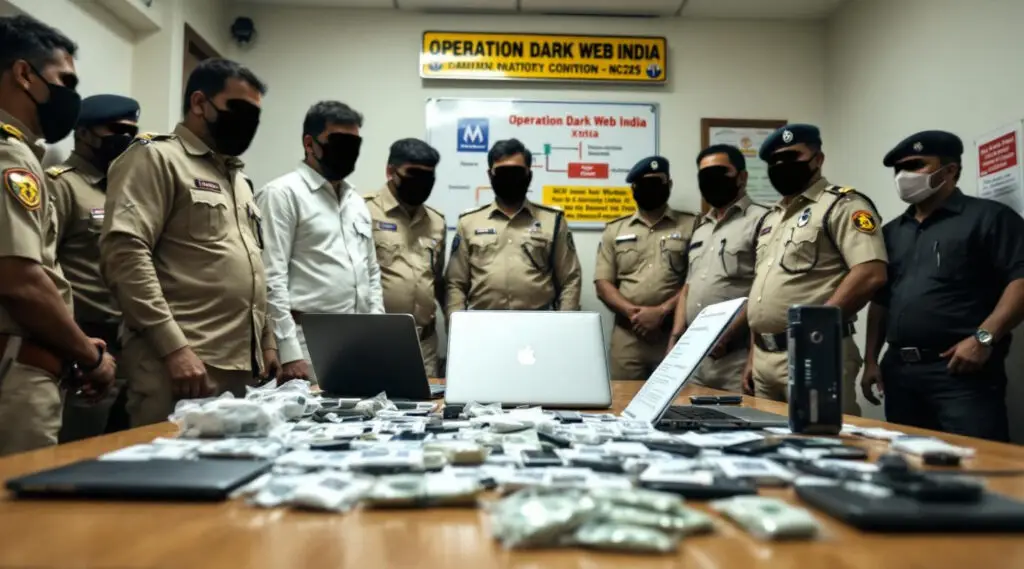India’s Narcotics Control Bureau (NCB) has successfully dismantled what it describes as the country’s “most prolific darknet drug syndicate,” leading to the arrest of a 35-year-old engineer from Muvattupuzha. The individual is accused of single-handedly operating the extensive network, all while his own family remained unaware of his illicit activities. This significant bust, part of an operation codenamed “MELON,” highlights the growing challenge posed by sophisticated online criminal enterprises utilizing advanced digital tools to evade law enforcement.
Operation MELON Seizes Drugs and Crypto Assets
The arrested suspect, identified as Edison, a mechanical engineer and Kerala native, was apprehended on Tuesday as part of Operation MELON. The operation resulted in substantial seizures, including 1,127 LSD blots, 131.66 grams of ketamine, and cryptocurrency assets valued at over $82,027 (₹70 lakh), which were found in a hardware wallet. According to local media reports, Edison had allegedly been operating as India’s sole ‘Level 4’ darknet vendor for the past two years, using the alias “Ketamelon” to conduct his widespread drug distribution activities across the nation.
Monero: The Privacy Coin of Choice for Illicit Activities
Edison allegedly sourced drugs from global suppliers, laundered the substantial proceeds through the privacy coin Monero (XMR), and then shipped narcotics to various cities across India. Monero is a privacy-centric cryptocurrency specifically designed to obscure transaction details, making it a preferred payment method for operators on darknet drug markets and other cybercriminals seeking to maintain anonymity. Blockchain analytics firm Chainalysis noted that darknet market operators have increasingly shifted to accepting only Monero, having learned the consequences of using more transparent currencies like Bitcoin.
Privacy Coins: Not Entirely Foolproof
Despite the perceived anonymity of privacy coins, experts caution that they are not entirely foolproof. Andrew Fierman, Head of National Security Intelligence at Chainalysis, emphasized that while there are concerns about criminals migrating to privacy coins for enhanced anonymity, the vast majority of illicit activity still utilizes mainstream cryptocurrencies such as Bitcoin, Ethereum, and stablecoins. These mainstream assets remain attractive to criminals for the same reasons they appeal to legitimate users: their cross-border nature, instantaneous transactions, and high liquidity, which facilitate rapid movement of funds.
The Enduring Traceability of Blockchain
Fierman further clarified that achieving “total privacy” in the cryptocurrency space is exceptionally difficult. He noted that privacy coins, despite their design, “operate on an immutable ledger,” meaning that “evidence of criminal transactions will exist forever.” This inherent characteristic of blockchain technology implies that even if immediate tracing is challenging, the transactional data remains permanently recorded, allowing for potential retroactive investigation and identification of criminal activity over time. This ongoing traceability provides a persistent avenue for law enforcement.
Extensive Investigation Leads to Bust
The NCB’s successful bust of Edison’s syndicate followed an intensive four-month investigation. During this period, authorities meticulously tracked Edison’s operations, which allegedly involved over 600 drug consignments shipped to major Indian cities including Bengaluru, Chennai, Delhi, and Himachal Pradesh. This prolonged and detailed surveillance highlights the complex and resource-intensive nature of dismantling darknet operations, requiring advanced technical capabilities and collaborative intelligence gathering to piece together the digital footprints of such illicit networks.
Global Crackdown on Cybercrime Infrastructure
The NCB’s operation against Edison’s syndicate is part of a broader global crackdown on cybercrime infrastructure that is increasingly linked to cryptocurrency. Just this week, the U.S. Treasury Department imposed sanctions on Russian hosting provider Aeza Group, accusing it of facilitating ransomware attacks and darknet drug markets that have targeted victims worldwide. These concerted international efforts underscore a growing commitment from law enforcement agencies across the globe to combat the use of digital assets and online platforms for criminal activities, signaling a coordinated push to disrupt the financial underpinnings of cybercrime.























